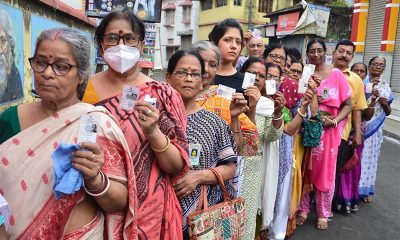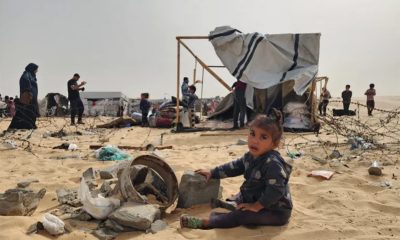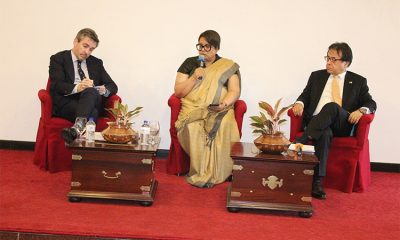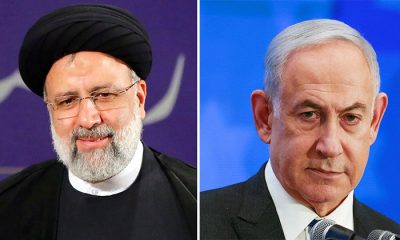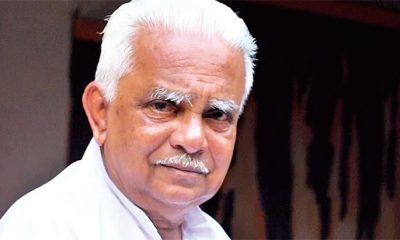Features
How populism becomes a setback in the quest for M-E peace
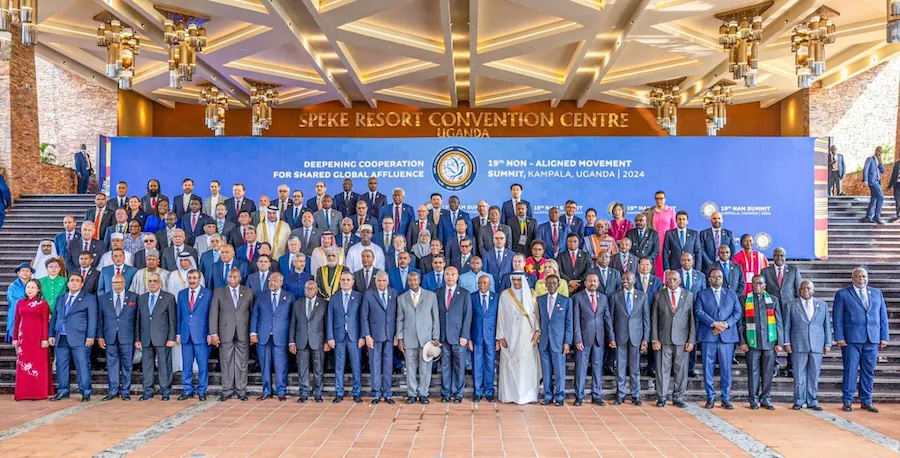
 Sri Lankan President Ranil Wickremesinghe could be described as having made all the pleasing observations, from an essentially Southern viewpoint, in his recent address to the 19th Non-aligned Movement (NAM) Summit, convened in Kampala, Uganda. For example, he outlined all the elements in a Middle East peace settlement, which have over the decades comprised a basically one-sided approach to regional peace.
Sri Lankan President Ranil Wickremesinghe could be described as having made all the pleasing observations, from an essentially Southern viewpoint, in his recent address to the 19th Non-aligned Movement (NAM) Summit, convened in Kampala, Uganda. For example, he outlined all the elements in a Middle East peace settlement, which have over the decades comprised a basically one-sided approach to regional peace.
It needs to be stated right away that the Palestinians are a much wronged people. Their cause is eminently just and the international community needs to act now to rectify the injustices borne by the Palestinians before they suffer worse atrocities in the present mind-numbing violence that has been unleashed with impunity on them by the Israeli state and its armed forces.
However, it cannot be stressed enough that the Israelis too have been, to a great degree, unfortunate victims of history. They too have ‘a case’ and it would be unrealistic on the part of those quarters that matter to overlook this fact in an earnest attempt by them at putting things right in the Middle East. In other words, the world needs to be even-handed in its efforts at resolving the Middle East tangle. Unless and until this condition is met it would be futile to expect enduring stability and peace in the region.
The need for even-handedness merits emphasis because over the decades movements and organizations basically representative of the South have apparently preferred to overlook the needs of the Israeli people in their policy prescriptions on the Middle East. Sri Lanka, a leading member of NAM, has thought it best to take a pro-Palestinian perspective over the years as well.
A moral principle could very well be at the centre of this Sri Lankan policy stance but it could also be economic survival that is among the prime considerations for Sri Lanka. More specifically, the continuous need for Arab oil could be among the motivating factors behind Sri Lanka’s policy outlook on a Middle East settlement.
However, decades of unrelenting Middle East violence ought to convince Sri Lanka and the South of the short-sightedness of their policy stances on the region. If the world is to make some progress towards peace in the Middle East, populist policy prescriptions on the Middle East imbroglio, such as the recognition of only Palestinian rights, would need to be shunned. The pressing requirements of the Israelis too would need to be taken into consideration and their need for durable security is chief among these needs.
However, the Israeli state too should help out in this process by seeking a just solution in the region. It would need to adhere to international humanitarian law, for instance, and recognize the need to adhere to UN injunctions on territorial issues.
It could very well be that Sri Lankan governments over the years have been ignorant about the history of the Middle East or have glossed over important facts pertaining to the nations of the region. If that is so, they would need to consult the chronicles more studiously and acquire a comprehensive knowledge of the troubled history of the region.
Meanwhile, an instructive lesson on Middle East peace- making comes from Europe where tens of thousands of ordinary people are massing on the streets for peace in the region.
Recent reports said that marchers in Brussels called on the EU to play a constructive role in bringing a fair solution to the Middle East problem. The protesters also called for an end to war crimes, attacks on civilians and denounced anti-Semitism or racism.
The latter calls by the marchers are of particular significance. It is important that those sections of the South that are protesting issues in the Middle East currently, take the cue from the Brussels civilians and highlight the illegality and destructive nature of racism and anti-Semitism.
Palestinians should never be discriminated against on account of their ethnic identity or culture but the same goes for the Israelis.
Racism in whatever guise needs to be denounced by the civilized world and no section of the international community that is seeking to play a constructive role in the Middle East could afford to forget this. Ideally, Southern political movements, such as NAM, should be loud in their denunciation of racism in all its forms.
It augurs well for the South that some economic and political heavyweights of Africa are coming to the fore of NAM and allied formations. Some such states are South Africa, Nigeria and Uganda. They could be said to be at the forefront of a re-energized and rejuvenated African continent, which could no longer be described as ‘dark’ or backward. On the contrary, some of the most economically dynamic countries are currently hailing from Africa.
If the key programs of NAM are to be taken to their logical conclusion, the major economic and political powers of Africa would need to forge close links with their counterparts of Asia and Latin America, as often pointed out in this column.
Once such tasks are accomplished, NAM and its allies would need to be in the forefront of historic undertakings, such as bringing a just peace to the Middle East. However, as mentioned, these Southern organizations would need to sustain and bolster their credibility by working towards achieving the best interests of all major parties to the Middle East conflict. Hopefully, all populist tendencies would be shelved by them in the process.
India and those Arab states which are party to the Abraham Accords did right by establishing close diplomatic and economic links with Israel. In the case of India, it was as early as in the early nineties when such ties were fostered.
The above measures were apt and advisable. Currently, the EU is doing likewise by engaging the Palestinians and the Israeli state diplomatically with a view to de-escalating the confrontation in the Middle East.
Treating Israel as an international outcast has proved counterproductive in the sense that such approaches have only strengthened the Israeli resolve to conduct itself in hostile fashion towards those sections of the world community that it sees as antagonistic. Accordingly, considerable soul-searching is expected of the South and such a process could very well begin with NAM.
Features
Kashmir terror attack underscores need for South Asian stability and amity

 The most urgent need for the South Asian region right now, in the wake of the cold-blooded killing by gunmen of nearly 30 local tourists in Indian-administered Kashmir two days back, is the initiation of measures that could ensure regional stability and peace. The state actors that matter most in this situation are India and Pakistan and it would be in the best interests of the region for both countries to stringently refrain from succumbing to knee-jerk reactions in the face of any perceived provocations arising from the bloodshed.
The most urgent need for the South Asian region right now, in the wake of the cold-blooded killing by gunmen of nearly 30 local tourists in Indian-administered Kashmir two days back, is the initiation of measures that could ensure regional stability and peace. The state actors that matter most in this situation are India and Pakistan and it would be in the best interests of the region for both countries to stringently refrain from succumbing to knee-jerk reactions in the face of any perceived provocations arising from the bloodshed.
The consequences for the countries concerned and the region could be grave if the terror incident leads to stepped-up friction and hostility between India and Pakistan. Some hardline elements in India, for instance, are on record in the international media as calling on the Indian state to initiate tough military action against Pakistan for the Kashmiri terror in question and a positive response to such urgings could even lead to a new India-Pakistan war.
Those wishing South Asia well are likely to advocate maximum restraint by both states and call for negotiations by them to avert any military stand-offs and conflicts that could prove counter-productive for all quarters concerned. This columnist lends his pen to such advocacy.
Right now in Sri Lanka, nationalistic elements in the country’s South in particular are splitting hairs over an MoU relating to security cooperation Sri Lanka has signed with India. Essentially, the main line of speculation among these sections is that Sri Lanka is coming under the suzerainty of India, so to speak, in the security sphere and would be under its dictates in the handling of its security interests. In the process, these nationalistic sections are giving fresh life to the deep-seated anti-India phobia among sections of the Sri Lankan public. The eventual result will be heightened, irrational hostility towards India among vulnerable, unenlightened Sri Lankans.
Nothing new will be said if the point is made that such irrational fears with respect to India are particularly marked among India’s smaller neighbouring states and their publics. Needless to say, collective fears of this kind only lead to perpetually strained relations between India and her neighbours, resulting in regional disunity, which, of course would not be in South Asia’s best interests.
SAARC is seen as ‘dead’ by some sections in South Asia and its present dysfunctional nature seems to give credence to this belief. Continued friction between India and Pakistan is seen as playing a major role in such inner paralysis and this is, no doubt, the main causative factor in SARRC’s current seeming ineffectiveness.
However, the widespread anti-India phobia referred to needs to be factored in as playing a role in SAARC’s lack of dynamism and ‘life’ as well. If democratic governments go some distance in exorcising such anti-Indianism from their people’s psyches, some progress could be made in restoring SAARC to ‘life’ and the latter could then play a constructive role in defusing India-Pakistan tensions.
It does not follow that if SAARC was ‘alive and well’, security related incidents of the kind that were witnessed in India-administered Kashmir recently would not occur. This is far from being the case, but if SAARC was fully operational, the states concerned would be in possession of the means and channels of resolving the issues that flow from such crises with greater amicability and mutual accommodation.
Accordingly, the South Asian Eight would be acting in their interests by seeking to restore SAARC back to ‘life’. An essential task in this process is the elimination of mutual fear and suspicion among the Eight and the states concerned need to do all that they could to eliminate any fixations and phobias that the countries have in relation to each other.
It does not follow from the foregoing that the SAARC Eight should not broad base their relations and pull back from fostering beneficial ties with extra-regional countries and groupings that have a bearing on their best interests. On the contrary, each SAARC country’s ties need to be wide-ranging and based on the principle that each such state would be a friend to all countries and an enemy of none as long as the latter are well-meaning.
The foregoing sharp focus on SAARC and its fortunes is necessitated by the consideration that the developmental issues in particular facing the region are best resolved by the region itself on the basis of its multiple material and intellectual resources. The grouping should not only be revived but a revisit should also be made to its past programs; particularly those which related to intra-regional conflict resolution. Thus, talking to each other under a new visionary commitment to SAARC collective wellbeing is crucially needed.
On the question of ties with India, it should be perceived by the latter’s smaller neighbours that there is no getting away from the need to foster increasingly closer relations with India, today a number one global power.
This should not amount to these smaller neighbours surrendering their rights and sovereignty to India. Far from it. On the contrary these smaller states should seek to craft mutually beneficial ties with India. It is a question of these small states following a truly Non-aligned foreign policy and using their best diplomatic and political skills to structure their ties with India in a way that would be mutually beneficial. It is up to these neighbours to cultivate the skills needed to meet these major challenges.
Going ahead, it will be in South Asia’s best interests to get SAARC back on its feet once again. If this aim is pursued with visionary zeal and if SAARC amity is sealed once and for all intra-regional friction and enmities could be put to rest. What smaller states should avoid scrupulously is the pitting of extra-regional powers against India and Pakistan in their squabbles with either of the latter. This practice has been pivotal in bringing strife and contention into South Asia and in dividing the region against itself.
Accordingly, the principal challenge facing South Asia is to be imbued once again with the SAARC spirit. The latter spirit’s healing powers need to be made real and enduring. Thus will we have a region truly united in brotherhood and peace.
Features
International schools …in action

 The British School in Colombo celebrated the 2025 Sinhala and Tamil New Year with the traditional rites and rituals and customs unique to the island nation, during a special Avurudu Assembly held at the school premises.
The British School in Colombo celebrated the 2025 Sinhala and Tamil New Year with the traditional rites and rituals and customs unique to the island nation, during a special Avurudu Assembly held at the school premises.
Students from all over the world, who are part of The British School in Colombo, gathered to celebrate this joyous event.
The special assembly featured traditional song and dance items from talented performers of both the Junior and Senior Schools.
On this particular day, the teachers and students were invited to attend school in Sri Lankan national costume and, among the traditional rituals celebrated, was the boiling of the milk and the tradition of Ganu-Denu.

Boiling of
the milk
In the meanwhile, a group of swimmers from Lyceum International School, Wattala, visited Australia to participate in the Global-ISE International Swimming Training Programme in Melbourne.
Over the course of 10 days, the swimmers followed an advanced training schedule and attended sessions at the Melbourne Sports and Aquatic Centre (MSAC), Victoria’s Nunawading Swimming Club, and Camberwell Grammar School.
In addition to their training, the group also explored Melbourne, with visits to key landmarks, such as the Parliament House and the Melbourne Cricket Ground (MCG), along with city tours and cultural experiences.

Traditional dance item

Tug-of-war contest

On arrival in Melbourne, Lyceum International School, Wattala, with Sri Lankan officials
Features
Perfect … and healthy

 Got a few more beauty tips to give you … for a perfect complexion, or, let’s say, a healthy skin.
Got a few more beauty tips to give you … for a perfect complexion, or, let’s say, a healthy skin.
* Honey Face Mask:
Take a tablespoon of raw honey and then warm it up by rubbing it with your fingertips. Apply the warm honey all over your face. Let this natural mask stand for about 10 minutes and then wash it off gently with warm water.
* Coconut Milk Face Mask:
You need to squeeze coconut milk out of a grated raw coconut and apply this milk all over your face, including your lips.
(This will help you gain a glowing skin. It is one of the best natural tips for skin care)
* Orange, Lemon, and Yoghurt Moisturiser:
To prepare this moisturiser, you need a tablespoon of orange juice, a tablespoon of lemon juice and a cup of plain yoghurt.
Mix them together and apply the paste all over your face, leaving it as a mask for 10 to 15 minutes. Next, take a damp handkerchief and use it to clean your face.
(This moisturiser brightens the complexion of your skin)
* Cucumber and Lemon:
Apply equal parts of cucumber and lemon juice on your face before taking a bath. Allow it to sit for 10 minutes before rinsing it off. This natural face beauty tip will brighten your skin tone and lighten blemishes if used on a regular basis. The best aspect is that it is appropriate for all skin types!
* Healthy Diet:
Aside from the effective home remedies, there are certain other factors to consider for skin care – and the first of them is your diet. Without the right nutrients, your skin cannot reverse the damage it suffers every day.
Eat fruits that are high in vitamin C because they contain antioxidants.
Adjust your diet to get the right amount of protein and unsaturated fats, as well as fresh green vegetables. All of this provides the right amount of nutrients so your skin can heal and improve itself naturally.
* Sun Protection and Care:
Another thing to keep in mind is not to step out of your home without sunscreen, especially with this awful heat we are experiencing at the moment. The hard rays of the sun can do you more damage than you could ever imagine.
By the way, you can prepare your own sunscreen lotion with glycerin, cucumber juice and rose water. You can also keep this lotion in the fridge.
-

 Business5 days ago
Business5 days agoDIMO pioneers major fleet expansion with Tata SIGNA Prime Movers for ILM
-

 News4 days ago
News4 days agoFamily discovers rare species thought to be extinct for over a century in home garden
-

 Features6 days ago
Features6 days agoProf. Lal Tennekoon: An illustrious but utterly unpretentious and much -loved academic
-

 Foreign News5 days ago
Foreign News5 days agoChina races robots against humans in Beijing half marathon
-

 Editorial5 days ago
Editorial5 days agoSelective use of PTA
-

 Features2 days ago
Features2 days agoRuGoesWild: Taking science into the wild — and into the hearts of Sri Lankans
-

 News2 days ago
News2 days agoOrders under the provisions of the Prevention of Corruptions Act No. 9 of 2023 for concurrence of parliament
-

 Features4 days ago
Features4 days agoThe ironies of history



